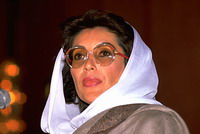Future of legal action against Benazir Bhutto is unclear
The conclusions of a money laundering investigation against former Pakistani Prime Minister Benazir Bhutto are received, but it is unclear whether there will be any further legal action against her in Switzerland.

"The investigating magistrate has sent me the file," Daniel Zappelli, chief prosecutor of the canton (state) of Geneva, told The Associated Press.
The prosecutor can now decide whether to file charges, suspend the proceedings or drop the case.
Since 2004, the magistrate had been conducting the investigation into allegations that Bhutto had used Swiss banks to launder millions of dollars in kickbacks.
Bhutto returned to Pakistan on Oct. 18 after eight years of exile to contest parliamentary elections set for January, hoping to win a third premiership. Negotiations with President Gen. Pervez Musharraf, a longtime political rival, have resulted in an amnesty for Bhutto covering the corruption charges that made her leave Pakistan and could lead to a power-sharing agreement.
Pakistan's Supreme Court is examining the legality of the amnesty.
Swiss lawyers are closely following the developments in Pakistan and there has been speculation in the Swiss media whether they might wait to see what Pakistan's highest court will decide.
Another Geneva magistrate convicted Bhutto and her husband, Asif Ali Zardari, in absentia of money laundering in July 2003 under a Swiss law that empowers high-level investigators to impose penalties without a court hearing.
They received six-month suspended sentences and were ordered to pay US$11 million (9.1 million EUR) to the Pakistani government, but the conviction was automatically thrown out when the pair contested it. They were then charged by another Swiss magistrate, Vincent Fournier, in July 2004 and the case was reopened.
Bhutto insisted that the corruption cases against her, including the one in Switzerland, were politically motivated and said she believes the Pakistan high court would let the amnesty stand.
Her lawyer in Geneva, Alec Reymond, said Monday he has not yet received notification that the file has been handed over to Zappelli. But he said the amnesty granted to Bhutto in her home country would play a decisive role in the Swiss proceedings.
If Pakistan's Supreme Court confirms the amnesty "it will necessarily be of a very high importance," Reymond told the AP. The alleged money laundering in Switzerland stems from alleged crimes in Pakistan, he added. "If there is no crime, there is no money laundering."
Swiss authorities said in 1998 they found about 20 million Swiss francs (then US$13.8 million) in Swiss accounts belonging to Bhutto and her family. The accounts were frozen at the request of Pakistan. Bhutto has said she has no connection with the accounts.
Swiss and Pakistani investigators allege much of the money came from Societe Generale de Surveillance, or SGS, one of the world's largest customs inspection companies, in exchange for business with the Pakistani government when Bhutto was in power. SGS has consistently denied the claims.
Bhutto was twice prime minister of Pakistan - she was the first female premier in the Muslim world - but her governments collapsed in 1990 and 1996 over corruption allegations.
Subscribe to Pravda.Ru Telegram channel, Facebook, RSS!




